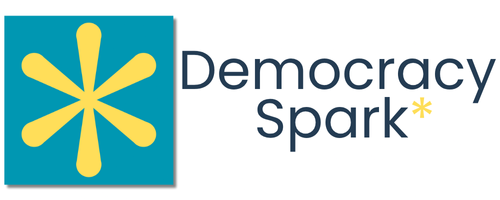Episode 52
Good News Friday - August 1, 2025
Click to Access Sources and Episode Materials
Takeaways:
- This week showed us that noticing the wins is just as crucial as staying alert to the problems. When we only see what's broken, we forget our power to fix things.
- We watched ordinary people organize across party lines and actually force policy changes. Six billion dollars in education funding got restored because superintendents, families, and lawmakers refused to back down.
- A federal judge reminded us why independent courts matter. When the government tried to silence research it disagreed with, the judiciary stepped in and said you can't violate the First Amendment just because you don't like someone's work.
- The Supreme Court proved that even in tough times, voting rights protections can still hold. When lower courts tried to strip away safeguards for minority voters, the high court said not so fast.
Transcript
Welcome to Democracy Sparks Weekly Good News Friday episode let's take a moment to celebrate the good things that are happening to protect our democracy.
Speaker A: ,: Speaker A:Let's take a look at what has been going on.
Speaker A:It's easy to focus on all that is wrong, cruel and harmful.
Speaker A:Noticing the good things is just as important.
Speaker A:When we only see the problems, we lose sight of our power to create change.
Speaker A:We forget that resistance is actually working.
Speaker A:This week could have felt overwhelming.
Speaker A:Between education funding freezes, humanities grant cancellations and ongoing attacks on voting rights, it would be easy to think the system isn't working.
Speaker A:Here's what actually happened.
Speaker A:Courts stepped up to defend constitutional rights, sustained organizing pressure forced policy reversals, and communities showed up for each other in powerful ways.
Speaker A:The thread connecting this week's victories is proof that our democratic institutions stakeholders still have teeth when people fight for them.
Speaker A:Federal judges blocked overreach, bipartisan pressure worked, and grassroots resistance turned arrests into symbols of defiance.
Speaker A:This is what democracy looks like when people refuse to back down.
Speaker A:Here's what democracy looked like this week.
Speaker A:Speaking of courts stepping up, let's look at what happened at the Supreme Court.
Speaker A:The high court extended a pause on a lower court ruling that would have eliminated a key tool for protecting minority voters under the Voting Rights act in seven states.
Speaker A:Justice Brett Kavanaugh's order keeps voting rights protections in place, while tribal nations in North Dakota challenged the ruling.
Speaker A:The decision would have barred individuals from filing discrimination lawsuits under the landmark civil rights law.
Speaker A:The decision came as North Dakota tribal nations prepare to ask the high court for full review of an 8th Circuit ruling that civil rights groups called a devastating blow to voting rights enforcement.
Speaker A:Three conservative justices said they would have denied the stay, but the majority recognized the urgency of protecting voting access.
Speaker A:Here's the good and this good news.
Speaker A:Even in our current political climate, the Supreme Court recognized that stripping away voting rights protections would cause irreparable harm.
Speaker A:This pause gives advocates time to build their case and shows that sustained legal challenges can still protect democracy's most fundamental right.
Speaker A:Another federal judge stepped up this week.
Speaker A:A judge in New York issued a preliminary injunction Friday night stopping the mass cancellation of National Endowment for the Humanities grants.
Speaker A:The ruling found that the administration violated the First Amendment by targeting projects based on viewpoint discrimination.
Speaker A:Judge Colleen McMahon found that officials terminated the grants based on the recipient's perceived viewpoint in an effort to drive such views out of the marketplace of ideas.
Speaker A:The ruling protects $175 million in humanities grants that had been canceled.
Speaker A:Many supported research on topics like environmental justice and historical injustices.
Speaker A:McMahon wrote that while the administration has discretion to focus priorities, agency discretion does not include discretion to violate the First Amendment, nor does it give the government the right to edit history.
Speaker A:Here's the good in this good news.
Speaker A:A federal judge just told an administration that it can't weaponize grant funding to silence research it doesn't like.
Speaker A:This is exactly how our system of checks and balances is supposed to work, and it's working now.
Speaker A:Let's talk about what happens when people organize across party lines.
Speaker A:The administration capitulated to overwhelming bipartisan pressure and legal challenges, announcing it would release more than $6 billion in federal education grants that had been frozen since July 1.
Speaker A:The funding supports after school programs, English language instruction, teacher training and services for migrant students.
Speaker A:These programs serve some of the country's most vulnerable children.
Speaker A:The victory came after 24 states and D.C. sued the administration.
Speaker A:Republican senators joined Democrats in demanding the funds release, and superintendents from across the country lobbied Capitol Hill.
Speaker A:Sen. Susan Collins and nine other Republican senators signed a letter urging release of the funds.
Speaker A:Over 600 superintendents reported they would have to lay off staff without the money.
Speaker A:Here's the good and this good news when people organize across party lines, it works.
Speaker A:Schools that were facing layoffs and program cuts now have the resources they need.
Speaker A:This shows that sustained pressure from educators, families and elected officials can force even the most resistant administrations to back down.
Speaker A:Let's shift from education to individual rights, where another federal judge made a crucial decision.
Speaker A:Judge Paula Zinis ordered the administration to restore supervision for Kilmar Abrego Garcia and barred immigration authorities from immediately detaining him.
Speaker A: prison in March, violating a: Speaker A:The ruling requires the government to provide three days notice before any deportation attempt.
Speaker A:It also restores the federal supervision that allowed Abrego Garcia to live and work in Maryland for years.
Speaker A:A separate Tennessee judge ruled that prosecutors failed to prove Abrego Garcia posed a danger to the community, rejecting claims he was an MS.13 gang member.
Speaker A:Here's the good in this good news Even when the government violates someone's rights in the most extreme way possible, federal judges are stepping in to restore due process protections.
Speaker A:The system is holding, and basic constitutional rights still mean something.
Speaker A:Speaking of international pressure creating change, let's look at what happened with Venezuelan prisoners After four months in El Salvador's brutal Sicot prison, 252 Venezuelan nationals were freed in a prisoner exchange that also secured the release of 10Americans from Venezuelan detention.
Speaker A:Venezuelans had been deported by the administration, despite many having no gang connections.
Speaker A:Some held legal status like Refugee Resettlement Approval and Temporary Protected Status.
Speaker A:Human rights advocates documented severe abuse at Si Cot, where prisoners described being beaten with wooden bats, robbed of savings and held in overcrowded cells for 23 and a half hours daily.
Speaker A:The Venezuelan government formally stated the men were being held under US Authority, not Salvadoran law, calling SICOT a concentration camp in official statements.
Speaker A:Here's the good in this good news.
Speaker A:International pressure and legal challenges force the release of people who should never have been imprisoned in the first place.
Speaker A:When human rights organizations document abuse and governments face diplomatic consequences, even the worst situations can change.
Speaker A:Now let's turn to grassroots organizing, where someone turned an arrest into a powerful symbol.
Speaker A:Isaiah Martin, a Democratic candidate for Texas's 18th congressional district, was arrested July 24 during a redistricting hearing for refusing to yield the microphone while protesting GOP gerrymandering efforts.
Speaker A:Video showed Martin being dragged to the ground as he shouted, history will not remember you kindly for what you have done.
Speaker A:All charges were dropped and Martin was released Friday evening.
Speaker A:Martin's arrest came during the first public hearing on Texas Republicans effortless to redraw congressional maps mid decade to create five additional GOP seats.
Speaker A:His forcible removal was captured on video and shared widely on social media.
Speaker A:It became a rallying cry against what critics call directed gerrymandering.
Speaker A:Here's the good in this good news.
Speaker A:Sometimes getting arrested for speaking truth to power is exactly what democracy needs.
Speaker A:Martin's willingness to risk arrest for his principles turned a redistricting hearing into a national story about fighting back against gerrymandering.
Speaker A:Let's look at climate accountability, where a major lawsuit is advancing.
Speaker A:Honolulu's groundbreaking lawsuit against major fossil fuel companies reached a crucial milestone this week, progressing further than similar climate litigation nationwide.
Speaker A: The city's: Speaker A:The case survived attempts by oil companies to dismiss it, the Hawaii Supreme Court denied their motions, and the US Supreme Court refused to take it up.
Speaker A:A Tuesday hearing on defense motions represents a significant step toward potentially holding fossil fuel companies accountable for climate damages, including sea level rise and extreme weather.
Speaker A:Here's the good and this good news.
Speaker A:A city is taking on some of the world's most powerful corporations and winning in court.
Speaker A:This case could set precedent for climate accountability nationwide and and shows that local governments can lead where federal action falls short.
Speaker A:Finally, let's look at political organizing paying off.
Speaker A: e one of the most competitive: Speaker A:Cooper has never lost a statewide race in over 30 years of North Carolina politics winning elections even in years when Republicans carried the state in presidential contests.
Speaker A:Cooper's entry immediately makes him the Democratic frontrunner to succeed retiring Republican Senator Thom Tillis.
Speaker A:The announcement represents a major recruiting victory for Democrats who need to net four seats to retake the Senate majority.
Speaker A:Here's the good in this good news.
Speaker A:Democrats just recruited their dream candidate for one of the most important Senate races in the country.
Speaker A:Cooper's track record of winning in purple North Carolina gives the party a real shot at flipping a crucial seat.
Speaker A:Let's look at the momentum that's building.
Speaker A:Four major federal court victories protected constitutional rights.
Speaker A:This week, $6 billion in education funding was restored through sustained organizing pressure.
Speaker A:252 prisoners were freed from notorious detention conditions.
Speaker A:Through international pressure, 24 states plus D.C. successfully sued to protect education funding.
Speaker A:Ten Republican senators joined Democrats demanding education funds released.
Speaker A:Multiple fossil fuel companies are facing advancing climate accountability lawsuits.
Speaker A:Voting rights protections were maintained in seven states through Supreme Court action.
Speaker A:We're building something powerful here, all of us together, and it's working.
Speaker A:The courts are holding when we defend them.
Speaker A:Bipartisan pressure works when we make it impossible to ignore.
Speaker A:International attention matters when we shine light on abuse.
Speaker A:This is what democracy looks like when people fight for it.
Speaker A:Remember, this is a marathon, not a sprint.
Speaker A:Celebrate these wins.
Speaker A:Rest when you need to and keep showing up.
Speaker A:The system works when we make it work.
Speaker A:This is Bonnie, founder of Democracy Spark, wishing you a wonderful weekend.


